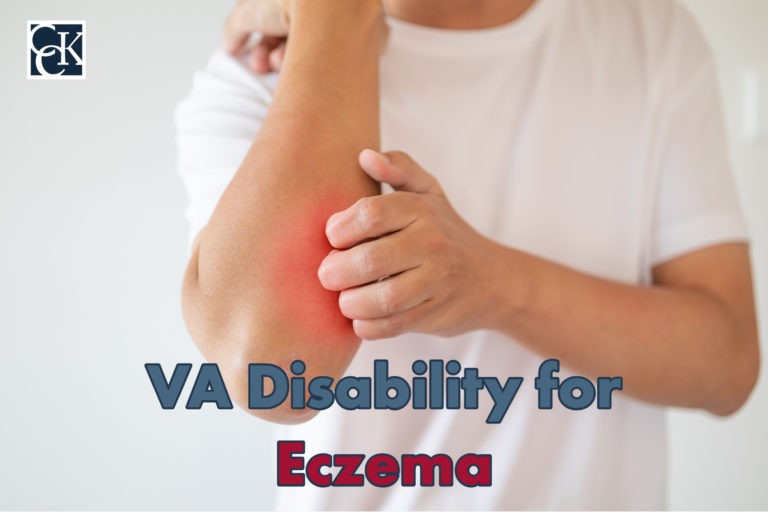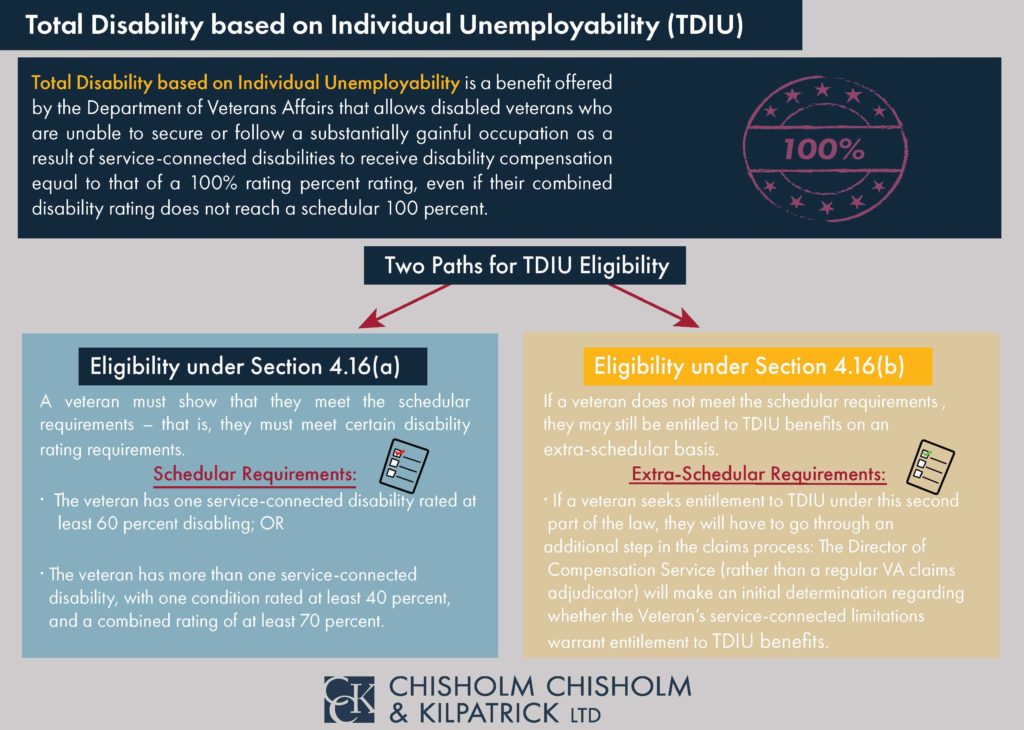VA Disability for Eczema

CCK Law: Our Vital Role in Veterans Law
Eczema is one of the skin conditions for which veterans can receive VA disability benefits. Continue reading to learn more about eczema and how to establish service connection or secure an increased rating for the condition.
What is Eczema?
Eczema, or dermatitis, is a condition characterized by general skin irritation that can cause a rash, dry or reddened skin, swelling, and blisters. The itching sensation that can accompany eczema can be very intense, often getting so bad that it can cause people to scratch until the skin bleeds. Once the skin bleeds, it can worsen the eczema and make the itching sensation worse. The National Eczema Association calls this the “itch-scratch cycle.”
Eczema is not contagious, meaning it cannot spread from one person to another. The condition can first appear during childhood, adolescence, or adulthood.
Types of Eczema
Eczema is the name assigned to a group of conditions, meaning there are several types, including:
- Atopic dermatitis—the most common form of eczema; occurs when the immune system become disordered and overactive
- Contact dermatitis—occurs when the skin becomes irritated or inflamed after coming in contact with a certain substance
- Dyshidrotic eczema—characterized by small itchy blisters that mostly form on the palms of the hand, soles of the feet, and edges of fingers and toes
- Nummular eczema—eczema that is often scattered in circular patches that can be similar in size to coins
- Neurodermatitis—eczema confined to only a few patches of skin, but with intense itching
- Seborrheic dermatitis—occurs on the body where lots of oil is produced, like the scalp
- Stasis dermatitis—eczema that occurs when there is poor circulation in the lower legs
Symptoms of Eczema
- Intense itching
- Dry, sensitive skin
- Discoloring of the skin
- Swelling
- Rough, bumpy, leathery, or scaley patches of skin
- Oozing or crusting of the skin
- Swelling
Diagnosing Eczema
To diagnose eczema, a person may visit their primary care physician or a dermatologist who specializes in skin conditions. The doctor may perform a physical examination to analyze the skin and ask about medical and family history. Eczema can be genetic, so it might be helpful to know if anyone in your family has had the condition.
Doctors may also perform a patch test, skin biopsy, or other test to diagnose eczema.
Treating Eczema
Ultimately, there is no cure for eczema, but there are treatments to reduce symptoms. Some treatments may include:
- Prescription ointments or topical medications
- Phototherapy
- Immunosuppressants

How to Establish Service-Connection for Eczema
To file a claim for eczema, veterans first need to submit VA Form 21-526EZ to VA. The form can be submitted online using VA’s eBenefits platform, by mail, in person through a Regional Office, or with the help of a legal representative.
With the form, the veteran will need to submit three things:
- A diagnosis of eczema;
- An in-service event or stressor which caused or aggravated the eczema;
- A nexus, which links the veteran’s eczema to their service
For example, a veteran serving in Iraq may begin to develop rashes because of the change in climate and may seek out treatment for these rashes during their service. Upon discharge, the veteran may then file a claim for eczema, as the rashes continue to persist even after the conclusion of their service. To file this claim, the veteran might submit a diagnosis of eczema, a lay statement explaining how the climate in Iraq caused the veteran to start experiencing rashes, and a nexus letter written by a doctor linking the veteran’s persistent eczema to climate exposure in Iraq.
VA Ratings for Eczema
VA rates eczema under 38 CFR § 4.118, or the Schedule of Ratings for the Skin. Eczema is rated under Diagnostic Code 7806, which is also used for dermatitis. Though eczema has a specific diagnostic code, it is evaluated using the General Rating Formula for the Skin. The ratings which can be assigned for eczema are described below:
- “60% – at least one of the following: characteristic lesions involving more than 40% of the entire body or more than 40% of exposed areas affected; or constant or near-constant systemic therapy including, but not limited to, corticosteroids, phototherapy, retinoids, biologics, photochemotherapy, psoralen with long-wave ultraviolet-A light (PUVA), or other immunosuppressive drugs required over the past 12-month period
- 30% – at least one of the following: characteristic lesions involving 20-40% of the entire body, or 20-40% of exposed areas affected; or systemic therapy including, but not limited to, corticosteroids, phototherapy, retinoids, biologics, photochemotherapy, PUVA, or other immunosuppressive drugs required for a total duration of 6 weeks or more, but not constantly, over the past 12-month period
- 10% – at least one of the following: characteristic lesions involving at least 5%, but less than 20%, of the entire body affected, or at least 5% but less than 20%, of exposed areas affected, or intermittent systemic therapy including, but not limited to, corticosteroids, phototherapy, retinoids, biologics, photochemotherapy, PUVA, or other immunosuppressive drugs required for a total duration of less than 6 weeks over the past 12-month period
- 0% – no more than topical therapy required over the past 12-month period and at least one of the following: characteristic lesions involving less than 5% of the entire body affected; or characteristic lesions involving less than 5% of exposed areas affected; or rate as disfigurement of the head, face, or neck (DC 7800) or scars (DCs 7801, 7802, 7804, or 7805), depending upon the predominant disability”
Presumptive Ratings Given for Skin Conditions
Veterans with eczema may be eligible for presumptive service connection, or presumptive ratings, in some instances. VA presumes service connection for certain conditions based on the location and time of service. This essentially means that veterans who served in these locations during the specified time periods should have an easier time establishing service connection.
Presumptive Conditions for Gulf War Veterans
Gulf War veterans with chronic skin conditions, such as eczema, can be eligible for presumptive service connection at any time if the condition can be rated at 10 percent or higher.
Compensation and Pension Exams for Eczema
VA may request a Compensation & Pension (C&P) exam to examine the veteran’s skin once a claim for eczema has been filed. A C&P exam is performed by a VA examiner or a VA contracted examiner. The purpose of the exam is to assess the eczema and determine if service connection is warranted. If service connection is granted, the findings of the exam will be used to assign a disability rating for the condition.
Prior to the exam, the examiner will review the veteran’s c-file so they are familiar with the veteran’s background. Then, during the exam, the examiner may physically examine the veteran and ask questions regarding their condition or their service. The examiner may ask when the veteran first experienced the rashes and what symptoms they experience.
If you are requested to attend a C&P exam, it is important to attend. Failure to attend an exam could result in the denial of your claim.
TDIU with Eczema
If service connection is granted for a veteran’s eczema and a rating is given, that rating can help contribute to a veteran’s eligibility for TDIU. TDIU, or total disability based on individual unemployability, is a monthly benefit available to veterans who are unable to work on account of their disability, or disabilities. This benefit compensates veterans at the 100 percent rating level, even if their overall combined rating level is less than that.
In order to be eligible for schedular TDIU, veterans must have one condition rated at 60 percent minimum OR two conditions that can be combined to reach 70 percent, where one condition is at minimum 40 percent. The criteria for schedular TDIU is outlined under 38 CFR § 4.16a. A rating given for eczema can help contribute to a veteran’s eligibility for TDIU.
Veterans who do not meet the necessary criteria for schedular TDIU may be eligible for extraschedular TDIU. For this form of TDIU, veterans must prove that their condition(s) uniquely hinder their ability to maintain substantially gainful employment. Extraschedular TDIU is rated under 38 CFR § 4.16b.

Need Help Getting VA Disability Benefits for Eczema?
Getting VA disability benefits for any skin condition can be tricky. If you need help establishing service connection or getting an increased rating for your condition, the accredited representatives at Chisholm Chisholm & Kilpatrick may be able to help you. Call our office today for a free case evaluation.
About the Author
Share this Post
